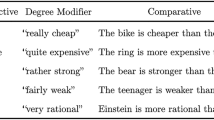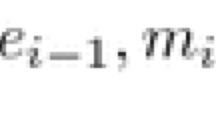Abstract
Probabilistic coherence is not an absolute requirement of rationality; nevertheless, it is an ideal of rationality with substantive normative import. An idealized rational agent who avoided making implicit logical errors in forming his preferences would be coherent. In response to the challenge, recently made by epistemologists such as Foley and Plantinga, that appeals to ideal rationality render probabilism either irrelevant or implausible, I argue that idealized requirements can be normatively relevant even when the ideals are unattainable, so long as they define a structure that links imperfect and perfect rationality in a way that enables us to make sense of the notion of better approximations to the ideal. I then analyze the notion of approximation to the ideal of coherence by developing a generalized theory of belief functions that allows for incoherence, and showing how such belief functions can be ordered with regard to greater or lesser coherence.
Similar content being viewed by others
References
Broome, J.: 1991, Weighing Goods, Blackwell, Cambridge, MA.
Cresswell, M.: 1985, Structured Meanings: The Semantics of Propositional Attitudes, MIT Press, Cambridge, MA.
Earman, J.: 1992, Bayes or Bust? MIT Press, Cambridge, MA.
Earman, J. (ed.): 1983, Testing Scientific Theories, vol. X of Minnesota Studies in the Philosophy of Science, University of Minnesota Press, Minneapolis.
Eells, E.: 1990, ‘Bayesian Problems of Old Evidence’, in Savage, C. W. (ed.), Scientific Theories, vol. XIV of Minnesota Studies in the Philosophy of Science (Minneapolis: University of Minnesota Press), pp. 205–223.
Ellis, B.: 1979, Rational Belief Systems, Blackwell, Oxford.
Fishburn, P.: 1988, Nonlinear Preference and Utility Theory, John Hopkins, Baltimore.
Foley, R.: 1993, Working without a Net: A Study of Egocentric Epistemology, Oxford University Press, Oxford.
Garber, D.: 1983, ‘Old Evidence and Logical Omniscience’, in Earman (1983), pp. 99–131.
Gibbard, A.: 1990, Wise Choices, Apt Feelings, Harvard University Press, Cambridge, MA.
Good, I. J.: 1983, Good Thinking, University of Minnesota Press, Minneapolis.
Hacking, I.: 1967, ‘Slightly More Realistic Personal Probability’, Philosophy of Science 34, 311–25.
Howson, C., and P. Urbach: 1989, Scientific Reasoning: The Bayesian Approach, Open Court, La Salle, IL.
Hurley, S.: 1989, Natural Reasons, Oxford University Press, New York.
Jeffrey, R.: 1983a, The Logic of Decision, second edition, University of Chicago Press, Chicago.
Jeffrey, R.: 1983b, ‘Bayesianism with a Human Face’, in Earman (1983), pp. 133–156. Reprinted in Jeffrey (1992), pp. 77–107.
Jeffrey, R.: 1991, ‘Postscript (1991): New Evidence Revisited’, in Jeffrey (1992), pp. 103–107.
Jeffrey, R.: 1992, Probability and the Art of Judgment, Cambridge University Press, Cambridge.
Kahneman, D., P. Slovic, and A. Tversky (eds.): 1982, Judgment under Uncertainty: Heuristics and Biases, Cambridge University Press, Cambridge.
Lewis, D.: 1979, ‘Scorekeeping in a Language Game’, Journal of Philosophical Logic 8, 339–59.
Levi, I.: 1986, Hard Choices; Decision Making Under Unresolved Conflict, Cambridge University Press, New York.
Lindley, D. V., A. Tversky, and R. V. Brown: 1979, ‘On the Reconciliation of Probability Assessments’, Journal of the Royal Statistical Society A, 142, Part 2, 146–180.
Maher, P.: 1993, Betting on Theories, Cambridge University Press, Cambridge.
Nisbett, R., and J. W. Ross: 1980, Human Inference, Prentice Hall, Englewood Cliffs, NJ.
Plantinga, A.: 1993, Warrant: The Current Debate, Oxford University Press, New York.
Polya, G.: 1949, ‘Preliminary Remarks on a Logic of Plausible Inference’, Dialectica 3, 28–35.
Polya, G.: 1954, Mathematics and Plausible Reasoning, vols. 1, 2, Princeton University Press, Princeton.
Ramsey, F.: 1926, ‘Truth and Probability’, in Frank Ramsey, Philosophical Papers, D. H. Mellor (ed.), (Cambridge: Cambridge University Press, 1990), pp. 52–109.
Rescher, N., and R. Brandom: 1979, The Logic of Inconsistency: A Study in Non-Standard Possible-World Semantics and Ontology, Rowman and Littlefield, Totowa, NJ.
Richard, M.: 1990, Propositional Attitudes: An Essay on Thoughts and How We Ascribe Them, Cambridge University Press, Cambridge.
Ross, W. D.: 1930, The Right and the Good, Clarendon Press, Oxford.
Savage, L.: 1967, ‘Difficulties in the Theory of Personal Probability’, Philosophy of Science 34, 305–10.
Skyrms, B.: 1984, Pragmatics and Empiricism, Yale University Press, New Haven, CT.
Skyrms, B.: 1987, ‘Coherence’, in N. Rescher (ed.), Scientific Inquiry in Philosophical Perspective (Pittsburgh: University of Pittsburgh Press, 1987), pp. 225–242.
van Fraassen, B.: 1983, ‘Calibration: A Frequency Justification for Personal Probability’, in R. S. Cohen and L. Laudan (eds.), Physics, Philosophy, and Psychoanalysis (Dordrecht: D. Reidel), pp. 295–319.
van Fraassen, B.: 1988, ‘The Problem of Old Evidence’, in Austin (ed.), Philosophical Analysis (Boston: Kluwer Academic Publishers), pp. 153–165.
van Fraassen, B.: 1989, Laws and Symmetry, Oxford University Press, Oxford.
Zynda, L.: 1995a, ‘Old Evidence and New Theories’, Philosophical Studies 77, 67–95.
Zynda, L.: 1995b, Probability and Human Rationality, Ph.D. Dissertation, Princeton University.
Author information
Authors and Affiliations
Additional information
Many people influenced the present version of this essay. Ban van Frassen, Richard Jeffrey, David Lewis, Mike Thau, and Alan Hájek provided extensive and invaluable written comments on the entire essay. Mark van Roojen provided helpful comments on Sections 3 and 4. Mike Than and John Barker provided essential aid when I was formulating the proofs in section 6. Finally, I am grateful for valuable discussion of the essay with Ned Hall, Fiona Cowie, Jim Woodward, David Hilbert, and Frank Arntzenius.
Rights and permissions
About this article
Cite this article
Zynda, L. Coherence as an ideal of rationality. Synthese 109, 175–216 (1996). https://doi.org/10.1007/BF00413767
Issue Date:
DOI: https://doi.org/10.1007/BF00413767




